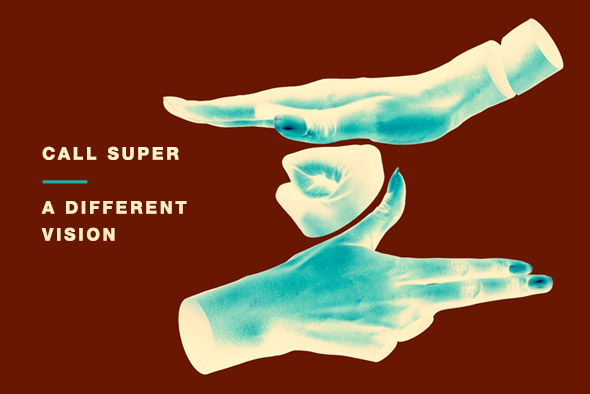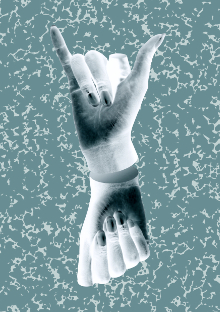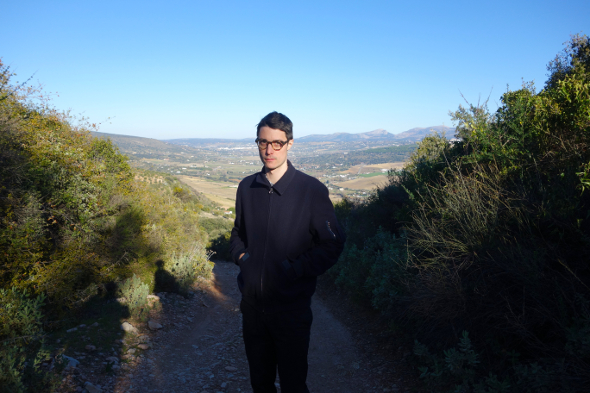Call Super: A Different Vision

Scott Wilson sits down with Joseph Seaton to discuss the unique space he’s carving out for himself in the world of techno.
Meeting producers to discuss their music never seems to get any easier, but as I travelled to interview Joseph Seaton in late November I had reason to be a little more apprehensive than usual. When his debut album as Call Super, Suzi Ecto, was announced last July, I had written the accompanying news story at Juno Plus. Revealed with an obtuse press release that gave little away, and having only had the chance to listen to the album briefly while writing it to get a flavour of what it contained, I fatally misinterpreted the album’s intentions, describing it as “ambient and downtempo” and earning myself a deserved ticking off from Seaton.
“For me it was important to just state ‘this is a techno record’”, Seaton explains when I offer my apologies, which he accepts graciously and with no hard feelings. “Not that I think my album is ‘visionary’, but I had a particular vision for it, and those visions for me are innate to the kind of techno music I love,” he says. “Sadly it’s become such a rare thing to have visions that are different to the mainstream techno narrative. It’s a shame, because for me it should be a world made up of individual actors’ visions, and it saddens me to see that’s not the case,” he feels. “That’s why I didn’t want to get bracketed into ‘Call Super does a downtempo record’. I needed to fire an early shot.”
It’s easy to understand why he was concerned. His music sits just outside what his peers are doing, being quite different to the productions of even his close friend and production confidant Objekt. While much of the current techno focus seems to be on linear four-to-the-floor rhythms with a touch of industrial grit, Seaton’s music is much more delicate. Suzi Ecto, though, is an album with frequencies that would create the desired effect in a club, its abstract style of thick audio brush strokes is visually rich enough to imagine hanging on the wall of a gallery if its tracks took on physical form. In a year of strong long-players, Suzi Ecto approached the problem of the electronic album more effectively than most, presenting a series of tracks that felt innovative, functional, and most importantly, personal.

While I was initially concerned that Seaton would be upset at what I wrote back in July, I quickly became more worried at how sharp he is. There’s almost no difference in age between us, but I feel like I’m sitting across from someone with 10 or 15 years more wisdom than their age of 30 suggest, and as we talk about everything from gender identity to the lost art of the VJ, I feel a little out of my depth in terms of my knowledge. Despite his self-confident demeanour however, Seaton’s clearly a very down-to-earth character, one who notes feeling alarmed at how much he seems to casually swear in previous interviews. “I don’t mind it in my own speech but on the page it didn’t look right to me somehow,” he notes self-consciously of his recent interview with The Quietus.
Seaton certainly isn’t the kind of person to cynically manipulate his persona like some producers might, but it’s clear he’s careful of how much of himself he does present publically. Our interview was originally pitched back in July when Suzi Ecto was announced, but he requested we do it towards the end of the year, so there wasn’t an overload of features surrounding its release, and in order to have the opportunity to reflect on the reception of the album. At this point – prior to this site and XLR8R awarding it album of the year – the reception had already been fairly unanimous in its praise. Now that it’s had some time to sink in, how does it feel?
“I feel really grateful for how the album’s been received,” Seaton says. “On the one hand I was amazed by how the narrative around the album was shaped by the first interview that I did with Rory Gibb at The Quietus, and helped construct the prism through which the record was seen. I also feel very grateful for the fact it didn’t get sidelined because it didn’t fit into the sort of places other records did this year. I feel really touched and honoured by the engagement with it, it’s marvellous from my perspective. I don’t really have a lot more to say, because in part I feel like a lot has been said about it.”
Given the release of Suzi Ecto in the same month as strong albums from artists in Seaton’s orbit – Ital, Lee Gamble and Vessel – and as the long-awaited comeback from Aphex Twin, he had right to be worried. But Seaton’s vision of techno as an inclusive, rich and varied world obviously struck a nerve in a way that many records didn’t in 2014. It was an album that felt considered, but not overthought, something perhaps related to the amount of time Seaton has spent developing his style. His first record came out in 2009, and the Call Super project originally started as a duo in 2011 with Matt Waites before Seaton took the name over as a solo concern. By the time he provided the debut release for Fabric’s Houndstooth label two years ago, there was a sense the years spent perfecting his music had paid off.
However, Seaton’s relationship with techno goes back way further. A close friend’s brother introduced him to techno when he was 14, tipping him and his friend off about mixes, scenes and clubs. Some of them, in South London, Seaton would be able to sneak into underage. By the time he attended his first mainstream club later in his teens – Turnmills – Seaton already had more of a dance music education than most manage by the time they reach their mid-20s. By this point, he was spending time with members of the Dissident crew in London, that included Ali Renault, Gatto Fritto, and Milo Smee, now boss of the Power Vacuum label and close friend of Seaton in Berlin.
Compared to the austere techno of Ostgut Ton, the sleek minimal of Villalobos or even the first wave of the dubstep crossover from Martyn and Shackleton prevalent during the late 2000s, the “raw box jams” of the Dissident label were quite the opposite. As Seaton puts it, it was a label based around “a completely different set of values” to other prevailing trends at the time. While there’s not much of a Dissident influence on Seaton’s music, that sense of techno being an open space for experimentation Seaton extols was definitely part of the label’s outlook. It was a label where contemporary Italo could sit alongside proto-acid bangers quite happily, and make logical sense. It’s something more common to Seaton’s fearless DJ sets, which are equally as lauded as his music. Last year’s three-hour set for Boiler Room for example saw him play everything from Beautiful Swimmers and Levon Vincent to Colin Potter and Crash Course In Science, tracing the connections between vintage and contemporary material with ease.
“The reason I like techno is because it’s so expansive,” he explains. “I remember there was a period when Jeff Mills was playing the Sugarhill Gang in his sets alongside pounding spacey stuff. It was around that time that CDJs had gained the loop function, and you could make a loop of something, speed it, pitch it up +16 and it would sound amazing., completely alien and old school. I really do feel that’s what marks me out as a techno DJ. I’m sure hip hop DJs would say the same, but it’s the most inclusive genre, and it should be, in its best sense, completely outward looking and expansive, and be able to suck everything else in. As soon as techno becomes linear tunnel-vision bullshit, it’s lost its art, it’s lost what makes it a great area of music to work in and be a part of. If techno can’t be fun, I’d rather down tools and leave the club,” he says firmly.
This is something Seaton feels quite strongly about, and the topic takes up much of our two-hour conversation. He notes his first visit to Berlin in 2006, when he recalls seeing Marcel Dettmann playing a set in Berghain during the club’s early days, when the residents would play what Seaton remembers as considerably stranger sets than today. “Dettmann would go for long stretches with the highs and the trebles turned right down,” he tells me. “And it would just be incredibly muffled and bassy. Then he’d change it by bringing in a track that absolutely slammed with no bass and just highs and then drop the bass on that. It would always clear out the room, and the core that were left would go apeshit, just creating this ferocious energy.”
While Seaton is careful to note his respect for DJs like Dettmann, he also feels like some of “the sense of fun and experimentation” that characterised the early years of Berghain has been lost somehow. Part of this is undoubtedly due to the residents getting much bigger and having to satisfy certain demands form their audiences – Ben Klock now plays Coachella slots for example – but as the popularity of the kind of techno Ostgut Ton and its peers helped to create proliferates, it has created a new generation of DJs who are perhaps a little too indebted to its sound, rather than finding their own voice.

“It’s because lots of people have got into techno who have never been to see a great techno DJ,” Seaton believes. “They’ve seen people who play one kind of thing in a club, and that’s fine, it has its place – a Rødhåd or someone like that has a very singular style, and you know what you’re going to get wherever you see him play. I like it for what it is, but if you go and see that and think ‘This is what techno is’, and try to recreate it, and to think that to throw in an African record, a disco record or even a jazz record is somehow to detract from whatever statement you’re trying to make, then in my mind you don’t really get it. You come from a place that’s weakening the genre.
“As soon as you define yourself as being that rigid, you’re fucked,” he continues. “That’s why I think we got to where we are. The same goes for house music. The Black Madonna for example is finally starting to get her due over here, and people are saying ‘she’s a great house DJ because she plays so many different kinds of music’. Isn’t that what every DJ should do? The raw, tunnelly techno should be the coathanger from which to drape your musical outfit, and the same goes for house.”
While Berlin’s techno scene was one of the city’s attractions for Seaton, he was equally as impressed by the “respectful civic pride”, “sophisticated street life” and “mutual respect” of its citizens during the World Cup in 2006 when he first visited, feeling at home in the German capital for more reasons than just music. In 2009 he relocated himself to the city fully, starting the short-lived Nocturnes label immediately afterwards and working on music whenever he could. Given Seaton’s relatively recent success, it’s easy to forget he’s been living in Berlin for far longer than many of the more recent ex-pats from the UK. The narrative of the UK producer who moves to Berlin in search of cheap rent and proximity to Berghain has become woven into the collective consciousness for those into club culture, one that’s all too easy for journalists to attach whether it’s accurate or not. It’s something that sits uneasily with Seaton, whose connection to the city runs much deeper.
“I feel when people attach a narrative to the city I live in, it destroys my own relationship and the narrative I have with that city,” he explains. “It’s not that I’m in any way better or special enough to distinguish myself from the other people who made the move for the reasons these writers are getting at, but simply because my relationship with the city is built around people and the relationships I’ve had with these people, I just feel like it’s hurtful to them. It destroys that. I know that’s the connection everyone will see, but there’s nothing I can do about that. That’s what Berlin is.”
Seaton’s advice to writers who are tempted to use the “Berlin-based” tag? “Well don’t. It’s that simple. Just don’t. I look at that and if it’s about someone else I think ‘poor sod’. There’s no need to describe anyone like that. If someone asks me “What do you, where are you from?”, I’m from London and I’m a musician. Just because it comes with less connotations, I feel it’s more accurate to the kind of headspace I occupy with my own work.”

Over the past few years this narrative around the producer who makes the pilgrimage to Berlin to further their career has become inescapable. Aside from cheap rent, Seaton has his own idea of why it’s so prevalent. “I think it’s because of what places like London have become,” he believes. “I think that’s what’s always missing in this debate when someone says ‘Gone to Berlin to follow the music’. No, he’s gone to Berlin, because, in part, where he was has been ruined by capitalism.” With Plastic People’s closure following just one and a half months after our meeting, and tasteless videos for high-end housing attracting the disgust of many at around the same time, it’s difficult to disagree with Seaton’s take on why Berlin is so attractive.
Though Seaton has made his home in Berlin, partly because of the pressures put on London’s club scene by the current government and economic situation, it’s Houndstooth – the label arm of a London club – that has provided him with a platform to do whatever he wants. “There was something attractive about being with a label that I felt I could carve out my own place on,” he explains. “And if I were to go with a label that was much closer to my sound or the sound I wanted to make as a whole, then that’s impossible to do – there’s nowhere to go. When it was launched the catchphrase was ‘an artist led label’ – that was how they sold it to me, and they went to great lengths to say how I’d be totally in charge.”
It doesn’t seem to be a coincidence that Seaton’s control over everything from art to press releases through to the number of interviews he gives has enabled his career to go from strength to strength, his identity only made stronger and more interesting by his lack of interest in conforming. A few days later I see him DJing at the Leisure System x Houndstooth night at The Hydra he’s in London for, where he closes the room with one of the most enjoyable techno sets I’ve seen for a long time. Even among the moments of more functional techno, there was a sense Seaton knew these records well, dropping Charlie’s Italo disco classic “Spacer Woman” among records I couldn’t have a hope of recognising. It may not have gone down well with the purists, but thankfully for those willing to look at techno a little differently, Seaton cares little for purism.
Interview by Scott Wilson
Illustrations by JRS
Photo by Daisy Lumley
Header image by Ilaria Pace, from an original illustration by JRS